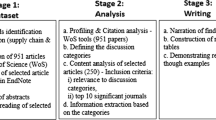
Overview
- First book to specifically address Ripple Effect in the supply chain
- Presents techniques for mitigating risk in industrial and service supply chains
- Editors are a prestigious group at the forefront of ripple effect research
Part of the book series: International Series in Operations Research & Management Science (ISOR, volume 276)
Access this book
Tax calculation will be finalised at checkout
Other ways to access
About this book
Ripple effect describes the impact of a disruption propagation on supply chain performance, structural designs and operational parameters. The ripple effect manifests when the impact of a disruption cannot be localized and cascades along the supply chain. The resulting structural dynamics can lead to capacity and demand fulfilment downscaling and negatively influence the firm’s financial and operational performance. The book delineates major features of the ripple effect and methodologies to mitigate the adverse impact of supply chain disruption propagation and to recover in case of severe disruptions.
The book provides fresh insights for supply chain management and engineering regarding the following questions:
- In what circumstance does one failure cause other failures?
- Which structures of the supply chain are especially susceptible to the ripple effect?
- What are the typical ripple effect scenarios and what are the most efficient ways to respond them?
Distinctive Features:
• It considers ripple effect in the supply chain from an multi-disciplinary perspective
• It offers an introduction to ripple effect mitigation and recovery policies in the framework of disruption risk management in supply chains for a broad audience
• It integrates management and engineering perspectives on disruption risk management in the supply chain
• It presents innovative optimization and simulation models for real-life management problems
• It considers examples from both industrial and service supply chains
• It reveals decision-making recommendations for tackling disruption risks in the supply chain in proactive and reactive domains.
Similar content being viewed by others
Keywords
Table of contents (15 chapters)
-
Front Matter
Editors and Affiliations
About the editors
Alexandre Dolgui is the Distinguished Professor and Head of the Department of Automation, Production and Computer Sciences at IMT Atlantique in Nantes, France. He earned his M.Sc./Engineer in Automated Systems of Data Processing and Management (Valedictorian) at the Minsk Radioengineering Institute, Belarus, his Ph.D. in Engineering Cybernetics and Computer Aided Production Management at the Academy of Sciences of Belarus, Institute of Engineering Cybernetics, Minsk, Belarus and his Dr. Habil. in University of Technology of Compiègne, France. He is a Fellow of the European Academy for Industrial Management, Member of the Board of the International Foundation for Production Research and the Editor-in-Chief of the International Journal of Production Research (T&F). His more recent research projects include Optimization of the Global Supply Chain in Automotive Industry (for Renault Group), Warehouse Design, Localization and Optimization (for Casino Group), and Design, Balancing and Optimization of Disassembly Workshops for CEA (French Commissariat for Atomic Energy). He is also a co-author of a Springer title on Supply Chain Engineering.
Boris Sokolov is the Head of the Laboratory for Information Technologies in Systems Analysis and Modeling at the St. Petersburg Institute of Informatics and Automation of the RAS (SPIIRAS) in St. Petersburg, Russia. From 2006 to 2017 he was Deputy Director for research of SPIIRAS. In 2008, he became an honored scientist in Russia. He is a Laureate of the Prize of the Government of the Russian Federation in the field of science and technology (2013). He is (co)-author of 7 monographs and books on system analysis, decision support systems, supply chain management, and systems and control theory, and of more than 570 scientific works published in various academic journals. His research interests are as follows: basicand applied research in integrated modelling, simulation, and mathematical methods in scientific research, optimal control theory, and mathematical models and methods of decision-making support in complex technical-organizational systems under uncertainties and with multi-criteria, and mobile IT in supply chain management processes. Over the past years, Professor Sokolov intensively developed an original applied theory of structural dynamics control.
Bibliographic Information
Book Title: Handbook of Ripple Effects in the Supply Chain
Editors: Dmitry Ivanov, Alexandre Dolgui, Boris Sokolov
Series Title: International Series in Operations Research & Management Science
DOI: https://doi.org/10.1007/978-3-030-14302-2
Publisher: Springer Cham
eBook Packages: Business and Management, Business and Management (R0)
Copyright Information: Springer Nature Switzerland AG 2019
Hardcover ISBN: 978-3-030-14301-5Published: 02 May 2019
eBook ISBN: 978-3-030-14302-2Published: 17 April 2019
Series ISSN: 0884-8289
Series E-ISSN: 2214-7934
Edition Number: 1
Number of Pages: XXI, 332
Number of Illustrations: 47 b/w illustrations, 50 illustrations in colour
Topics: Operations Research/Decision Theory, Supply Chain Management, Industrial and Production Engineering



